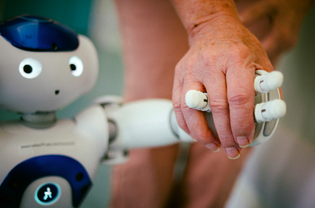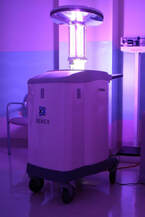|
One issue that we’re facing right now is the aging crisis, where the elderly population is skyrocketing while mothers are having less and less children, partly due to industrialization. The World Health Organization conducted a study in 2015 dealing with population growth. Between 2015 and 2050, the proportion of the world's population aged over 60 years will nearly double from 12% to 22% (World Health Organization). With the rising aging population will come the increased importance of efficient healthcare systems and diagnoses in order to address the increased number of patients. However, not only are mothers having less children, but our healthcare system is becoming less able to support the influx of patients. According to the American Association of Medical Colleges, there will be a shortage in the US of between 40,000-108,000 physicians (AAMC 2018). Nurses, who are already overwhelmed with the large amount of tasks they must complete on a daily basis, will need assistance as the number of patients grow. But that’s where AI comes in.
Nurses will receive the assistance they need. A lot of the logging tasks that they must complete can now be fulfilled by robots, allowing them to spend more time on more important and less mechanical problems.
Moreover, a lot of the healthcare improvements discussed in our last blog post, like improved detection of diseases, will play a crucial role in developing an efficient, end-to-end pipeline for elderly patients. Artificial intelligence is revolutionizing the treatment for the aging crisis, and it’s important we work to improve AI technologies and optimize them for the future.
0 Comments
Will robots take over the world? We’ve all heard this hypothetical, and rather disturbing, dystopian scenario of humanoids stealing our jobs and eventually causing ruin to mankind. Now, this situation is decades away for it to even be a plausible concern. But right now? These very autonomous robots are saving lives in hospitals, transforming the jobs of firefighters, and even creating more jobs. Our first blog post will cover just one of these benefits: healthcare. The debate about autonomous robots revolves around the tradeoff between the ethicality of having human tasks conducted by robots as compared to the precision and accuracy gained by using them. But the benefits seem to outweigh the concerns -- at least, in hospitals. Autonomous robots will save thousands of lives in the healthcare industry. The Center for Disease Control conducted a study in 2017 dealing with the hospital-acquired diseases including MRSA and C. Diff. Their study stated that 1 in 25 people contract these infections (Center for Disease Control). The Xenex Robot, a robot that makes hospital areas more hygenic, changes this. According to a study conducted by the Westchester Medical Center, the introduction of the Xenex Robot leads to a 70% reduction in such diseases (Westchester Medical Center). Autonomous robots such as Xenex have the potential to significantly increase human safety and health.
On the other hand, autonomous robots have been proven superior to traditional surgery methods, eliminating these errors. The Nationwide Inpatients Sample Data Project was a study in 2015 conducted examining over 1 million cases of robotic/nonrobotic surgery. The study found that a patient was 4x more likely to perish from traditional open-surgery methods than from robotic surgery. (US National Library of Medicine). Thus, through increased precision, autonomous robots have the potential to save countless lives in eliminating the errors inherent in our human nature. Ultimately, hospitals are one group that face a lot of the benefits of artificial intelligence and robotics. Thank you for reading, and tune in soon to hear about our next topic in artificial intelligence!
In response to the COVID-19 crisis, CodeBuddies is launching a monthly online blog dedicated to technology and artificial intelligence to keep individuals informed about how these fields are contributing to the advancement of society and even how AI is being used during this crisis. Stay tuned for our first blog post soon!
|
ArchivesCategories |




 RSS Feed
RSS Feed
